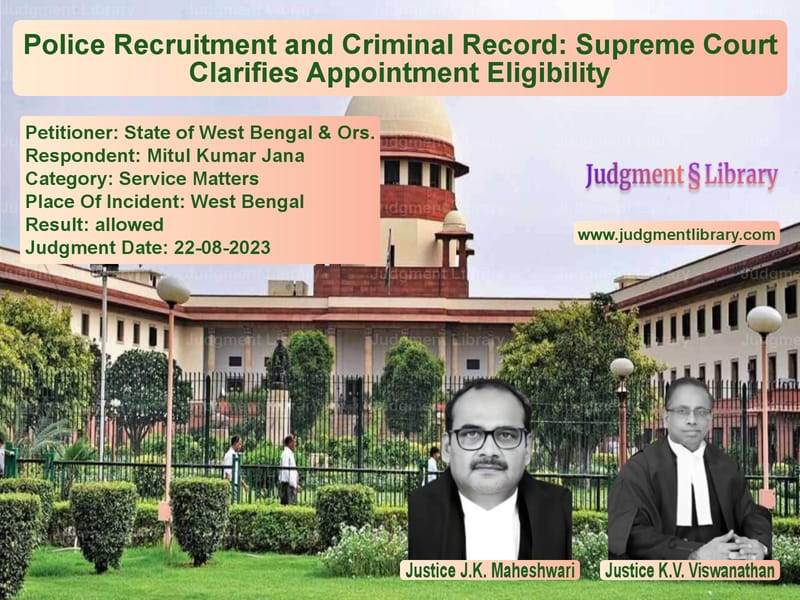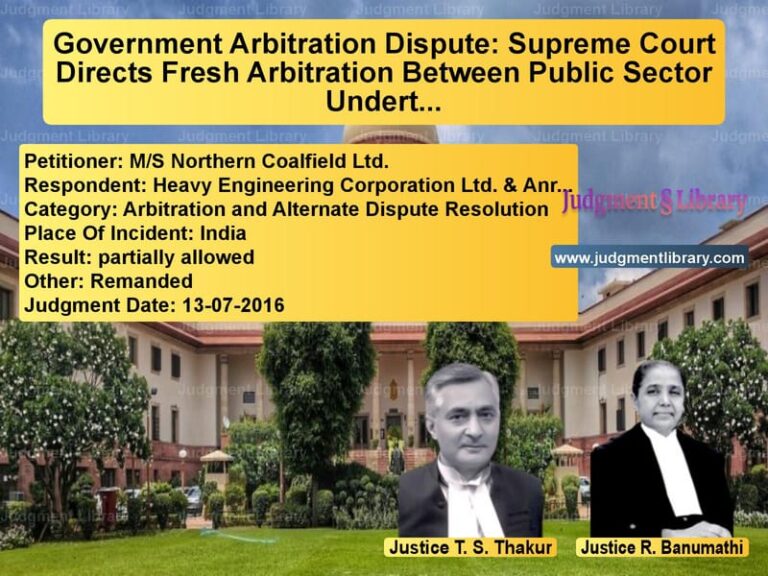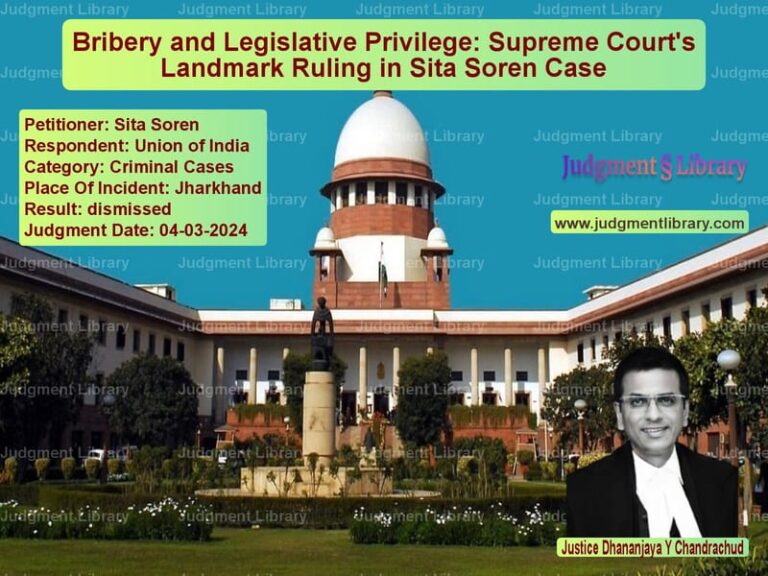Police Recruitment and Criminal Record: Supreme Court Clarifies Appointment Eligibility
The Supreme Court of India recently ruled in the case of State of West Bengal & Ors. v. Mitul Kumar Jana, addressing a crucial issue concerning police recruitment, criminal records, and the duty of candidates to disclose pending cases. The case revolved around whether a candidate who had a pending criminal case at the time of recruitment but was later acquitted should be denied appointment based on suppression of information.
Background of the Case
The dispute arose when Mitul Kumar Jana, the respondent, applied for the position of constable in the West Bengal Police Force. He successfully cleared all selection rounds, including the physical efficiency test and interview. As part of the recruitment process, he was required to submit a ‘Police Verification Roll’ disclosing any past criminal record. However, during police verification, it was revealed that he was implicated in a criminal case (Case No. 124 of 2007), where a charge sheet had been filed against him before the recruitment process.
Upon scrutiny of the verification form, the authorities rejected his appointment, citing that he had suppressed material information about his involvement in a pending criminal case. He challenged the decision before the West Bengal Administrative Tribunal, which held that there was no suppression of material facts on his part. The matter was subsequently taken to the Calcutta High Court, which ruled in his favor and directed the authorities to issue his appointment letter, subject to the final outcome of the criminal case.
Key Legal Issues
- Whether failing to disclose a pending criminal case constitutes suppression of material facts.
- Whether a candidate who is later acquitted in a criminal case is still eligible for appointment.
- Whether the police department has discretion to deny employment based on character and antecedents, even after acquittal.
Petitioner’s (State of West Bengal) Arguments
- The candidate was involved in a criminal case before the selection process, and he deliberately failed to disclose this fact.
- Integrity and moral character are essential for police recruitment, and a person involved in criminal litigation, even if acquitted later, may not be suitable for service.
- The authorities relied on R. Radhakrishnan v. Director General of Police, arguing that suppression of criminal history is a valid ground for rejection, even if the candidate is later acquitted.
- The High Court erred in directing appointment while the government retained discretion to assess suitability.
Respondent’s (Mitul Kumar Jana) Arguments
- The recruitment form only required disclosure of previous arrests, detentions, or convictions. Since he had not been arrested or convicted at the time, he did not suppress any information.
- The High Court correctly noted that the authorities never explicitly asked candidates to disclose pending criminal cases.
- He had been honorably acquitted in the case, meaning there were no adverse findings against him.
- He was unfairly deprived of his employment despite clearing all selection rounds.
Supreme Court’s Judgment
The Supreme Court ruled in favor of Mitul Kumar Jana, holding that the authorities wrongly denied him appointment. The Court made the following key observations:
- Scope of Disclosure: The Court noted that the verification form specifically required candidates to disclose past arrests, detentions, or convictions. Since the respondent had not been arrested or convicted at the time of submission, he had not provided false information.
- No Suppression of Facts: The Court held: “The information sought in the verification roll was not specific regarding pending cases. The respondent answered correctly as per the format.”
- Effect of Acquittal: The Court emphasized that the respondent had been honorably acquitted in the case, meaning that no evidence was found against him.
- Public Employment and Character Assessment: The Court acknowledged that government authorities have discretion in assessing a candidate’s suitability but held that such discretion must be exercised reasonably and not arbitrarily.
Directions Issued
- The Supreme Court upheld the High Court’s order, directing the authorities to consider the respondent for appointment.
- Authorities were instructed to complete the process within four weeks.
- The appointment would be granted with notional benefits (such as continuity in service and pay fixation) but without back wages.
Impact of the Judgment
This ruling has significant implications for public employment and recruitment policies:
- Clarification on Disclosure Requirements: The judgment reinforces that recruitment forms must clearly specify the nature of information required, and vague questions cannot be used to reject candidates.
- Protection of Candidates from Arbitrary Rejections: The ruling ensures that candidates are not unfairly denied employment for non-disclosure of information they were not required to provide.
- Balance Between Character Assessment and Legal Rights: The judgment sets a precedent that government employers must apply reasonable discretion when assessing character suitability.
Conclusion
The Supreme Court’s decision in State of West Bengal & Ors. v. Mitul Kumar Jana is a landmark ruling that clarifies the legal position regarding non-disclosure of pending criminal cases in public employment. By affirming that a candidate cannot be penalized for failing to disclose information that was not explicitly required, the judgment upholds the principles of fairness and transparency in recruitment. The ruling will guide future cases involving police and government job applicants with prior legal history.
Petitioner Name: State of West Bengal & Ors..Respondent Name: Mitul Kumar Jana.Judgment By: Justice J.K. Maheshwari, Justice K.V. Viswanathan.Place Of Incident: West Bengal.Judgment Date: 22-08-2023.
Don’t miss out on the full details! Download the complete judgment in PDF format below and gain valuable insights instantly!
Download Judgment: state-of-west-bengal-vs-mitul-kumar-jana-supreme-court-of-india-judgment-dated-22-08-2023.pdf
Directly Download Judgment: Directly download this Judgment
See all petitions in Recruitment Policies
See all petitions in Public Sector Employees
See all petitions in Employment Disputes
See all petitions in Judgment by J.K. Maheshwari
See all petitions in Judgment by K.V. Viswanathan
See all petitions in allowed
See all petitions in supreme court of India judgments August 2023
See all petitions in 2023 judgments
See all posts in Service Matters Category
See all allowed petitions in Service Matters Category
See all Dismissed petitions in Service Matters Category
See all partially allowed petitions in Service Matters Category







